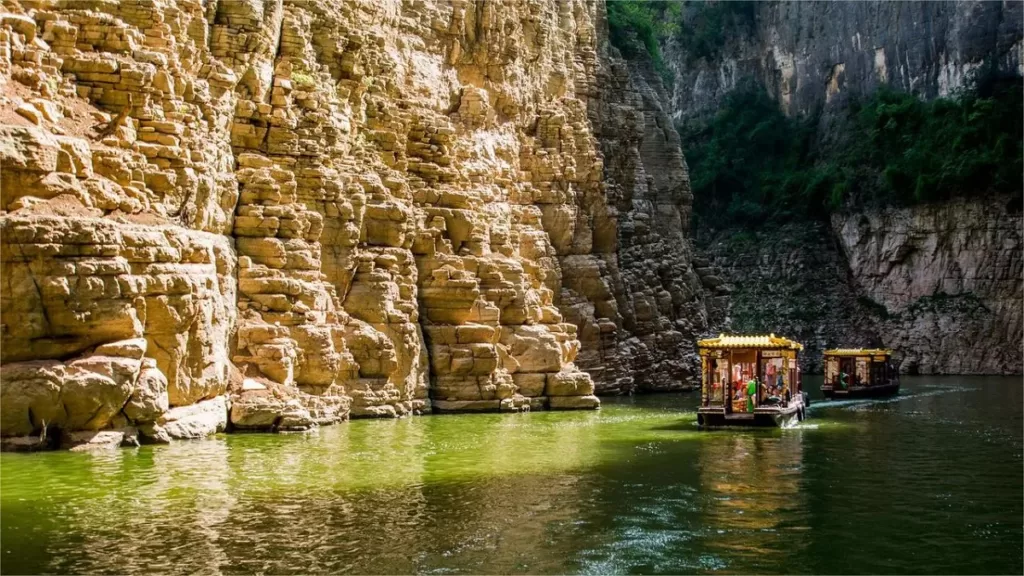Shennv Stream (神女溪), often referred to as “Beautiful Maiden Stream” by locals, is a natural marvel hidden within the majestic landscapes of Chongqing, China. Originating from the lofty Bao Feng Mountain at an altitude of 1,462 meters, this 15-kilometer-long watercourse carves its way through a terrain of swift waters, shallow streams, and narrow gorges. Approximately 10 kilometers of Shennv Stream meanders through an untouched and secluded primitive valley. With the reservoir formed by the Three Gorges Dam, it has become possible to explore this hidden gem by boat, revealing its breathtaking beauty and its original inhabitants who seemingly appeared from the mists of time. What was once known to only a few photographers has now become a new highlight for travelers on their Three Gorges adventure.
Shennv Stream offers a picturesque display of natural beauty, with the Five Peaks of Cuiping, Feifeng, Qiyun, Shangsheng, and Jingtang, collectively known as the Twelve Peaks of Wushan, adorning both sides of the stream. These peaks, covered in emerald-green foliage, create a stunning backdrop as the stream winds through the landscape.
Table of Contents
- Basic Information
- Location and Transportation
- Unsolved Mysteries
- Vlog about Shennv Stream
- Other Attractions in Wushan County
Basic Information
| Estimated Length of Tour | 1 – 2 hours |
| Shennv Stream Cruise Ticket | 110 RMB |
| Length of Shennv Stream Cruise | About 1 hour |
| Operating Time | 8.30 – 13.00 |
| Telephone Number | 0086-023-57756666 |
Location and Transportation
Shennv Stream is situated on the southern bank of the Yangtze River, with its source originating from Guandu Town in Wushan County, Chongqing. In its upper reaches, it is known as Guandu River, and as it meanders downstream, it takes on the names of Ziyang River and Shennv Stream. Eventually, Shennv Stream converges with the Yangtze River at Qingshi Town, situated on the opposite side of Shennv Peak’s foothills.
To reach Shennv Stream, you have several transportation options:
- By Train:
- Take the train on Chengdu-Dachuan-Wanzhou railway to Wanzhou. The ticket costs approximately 68 RMB per person and the journey takes around 2.5 hours. From Wanzhou, transfer to a Yangtze River fast boat that will take you directly to Wushan Port, a 3-hour journey with a ticket price of 200 RMB.
- By Bus:
- Depart from Chongqing Bus Terminal North Station or Chaotianmen Long-Distance Bus Station by long-distance bus bound for Wanzhou. The bus fare may vary depending on the bus type, costing around 50 RMB, 75 RMB, or 85 RMB, with a travel time of approximately 2.5 hours. Upon reaching Wanzhou, transfer to a fast boat to Wushan, which takes 3 hours and costs 200 RMB.
- By Boat from Chongqing:
- Depart from Chongqing Chaotianmen Port by a fast boat, and enjoy a 10-hour journey to Wushan, with a ticket price of 300 RMB.
Unsolved Mysteries
Suspended Coffins

Shennv Stream’s allure extends beyond its natural beauty; it boasts two compelling unsolved mysteries that have intrigued explorers and historians for generations. The first enigma centers around the ancient cliffside coffins. These coffins, made from both wood and stone, are perched on cliffs towering hundreds of meters above the stream’s surface. To this day, it remains a puzzling question as to how the ancient people managed to transport these heavy coffins to such precarious heights without the aid of modern tools or machinery. Even with the technology available today, it would be an extraordinary feat.
Cliffside Pathway

The second mystery that continues to baffle experts is the cliffside pathway that clings to the precipitous cliffs. Visitors to Shennv Stream can observe this ancient pathway while riding a boat through the area. The pathway hangs high above, perched on the steep cliffs that are surrounded by towering mountain peaks. According to expert analysis, this ancient pathway dates back more than 2,300 years to the Warring States period. The question that lingers is how the people of that time managed to chisel out such a pathway in such a treacherous location, with sheer cliffs both above and below. Even in contemporary times, replicating such a remarkable engineering feat would be a formidable challenge.



